Great expectations: How to cater to Gen Z international students

Service Wins Everywhere and Every Time – It’s a Generational Thing
The survey asked agents to identify the issues most important to them in developing a successful relationship and supporting their efforts to send more students overseas. In every market and for almost every agency, large and small, response times to enquiries and applications are by far the most important factor. We have been running these surveys for six years, and the result never changes.
99% of respondents globally identified response times for enquiries as important, and 98% gave the same weighting to application response times.
Of course, there are other factors which are important to agents, as the graphic below illustrates. Student feedback to agents on their choice is important, as is the ranking, although there are major regional variations which we explore further on.
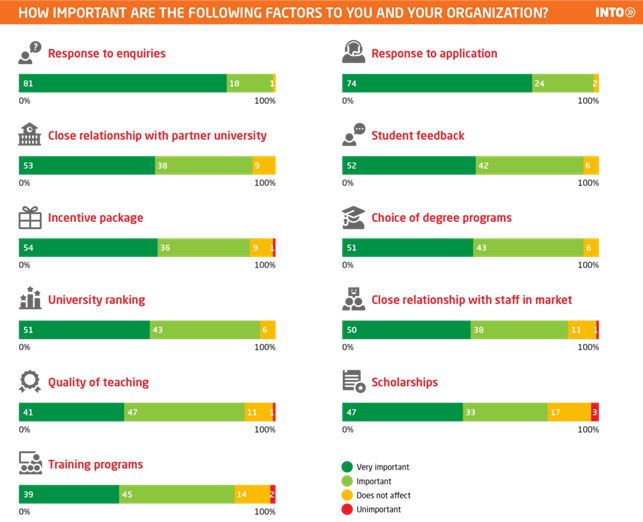
However, all other things being equal, agility and responsiveness appear to be the starting point for any successful engagement strategy. As the South China Morning post reported, Generation Z—those born after 1996—have grown up in a world defined by instant access. Referring to Chinese consumers’ shopping habits, it reports, “About 34 per cent of Gen Z said they want same-day delivery, while another 27 per cent said they want instant delivery within two hours or within half a day. Only 22 per cent said they are satisfied with next-day delivery.” So, waiting for weeks, or even months, for a decision is completely alien to them. Yet, timely response is still something which many universities and colleges the world over struggle with.
Regional Variations: China v. South Asia – A Rankings Game in China
The survey provides evidence to what many people observe anecdotally—that China values rankings as more important than does any other source market. Approximately 65% of Chinese respondents indicated that rankings are very important to them, compared to 52% of South Asia-based respondents.
Conversely, South Asian agents ascribed a greater importance to the availability of scholarships. 96% of respondents indicate they are important or very important, compared to 62% of Chinese agents. That is not to say scholarships are unimportant in China, but that rankings matter more there.
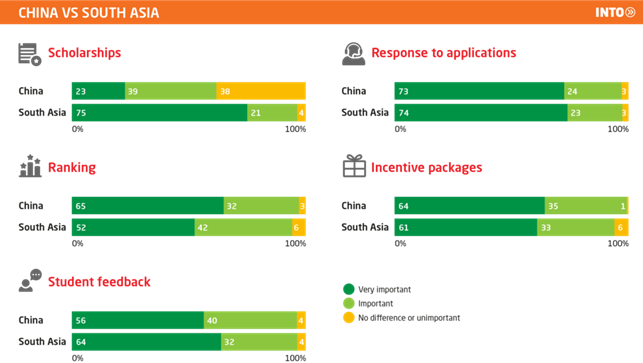
Of course, response times have almost equal significance wherever an agent is based.
Does destination country matter?
To better understand the data, we compared agents based on the destination countries to which they send students and by their home regions. For China-based agents, the results are almost identical. Whether the agency counsels towards the United States or the United Kingdom, the importance it ascribes to various influencing factors is more or less identical.
In other words, agents’ marketing messages—what they value—is determined more by where they are based rather than where they send their students for overseas study.
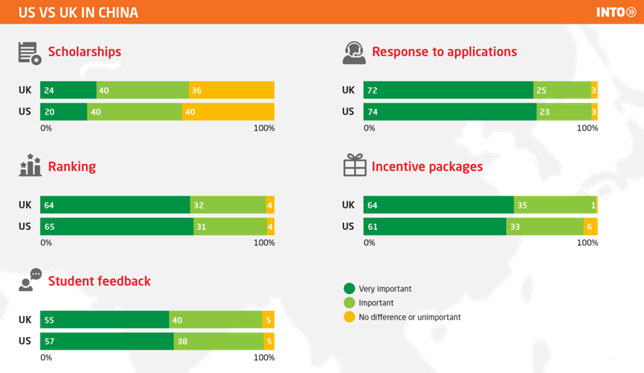
We did identify some differences in South Asia. Rankings and student feedback on their experiences do tend to be more important to counselling organizations specializing in sending students to the United States than to those focused on the United Kingdom as a destination. The availability of scholarships and response times are equally important to South Asian agents, regardless of whether they specialize in sending students to the United Kingdom or the United States.
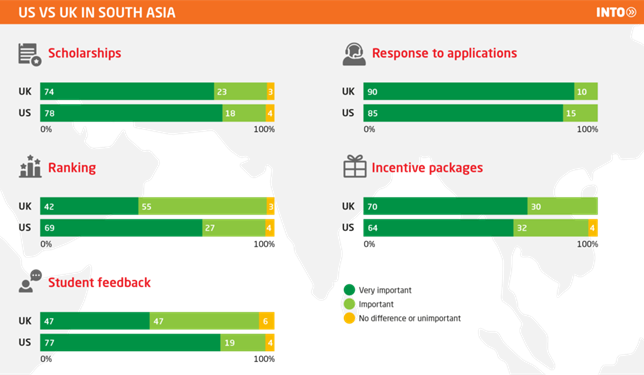
What’s important to students: An agent perspective
We asked agents to identify the factors which they believe motivate their students when traveling overseas for study. Again, we segmented the answers by key region and by intended study destination—focusing on the United Kingdom and the United States.
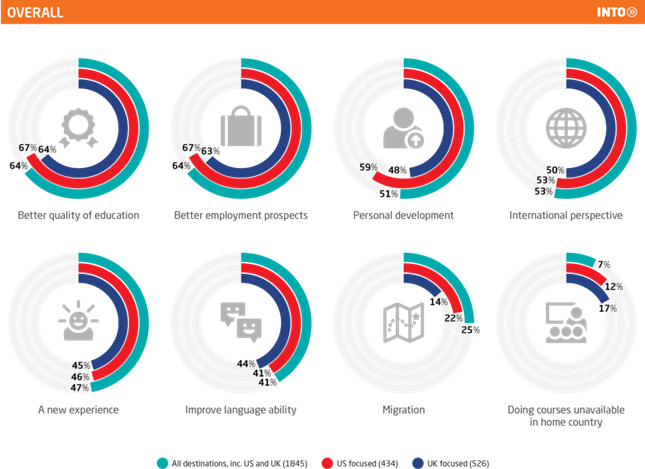
Globally, agents reported that students’ motivations are driven in large part by the prospect of a better quality of education and by better long-term employment prospects. That is not to say that students intend to migrate long term. In fact, where China is concerned, only 17% of respondents cited migration as a motivating factor for students. Migration drives students’ decisions more in South Asia, where 44% of respondents indicated this is a motivating factor for students choosing the United States.
The survey also sheds light on increasing education capacity around the world. Overall, only seven percent of respondents said students were motivated to study overseas to do a program unavailable in their home country, although that number rises to 28% and 21% for South Asia- and China-based agents, respectively.
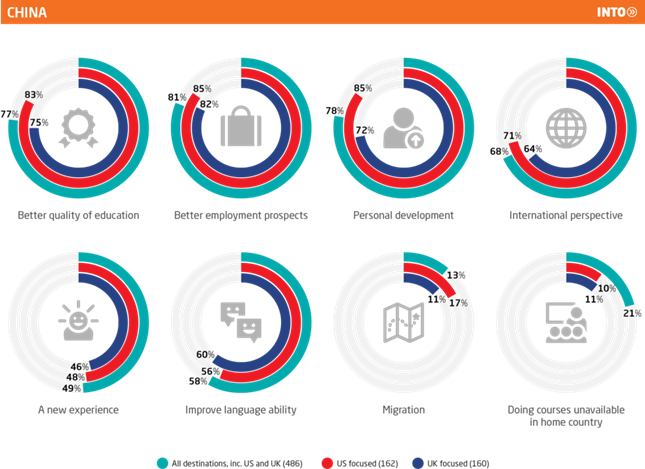
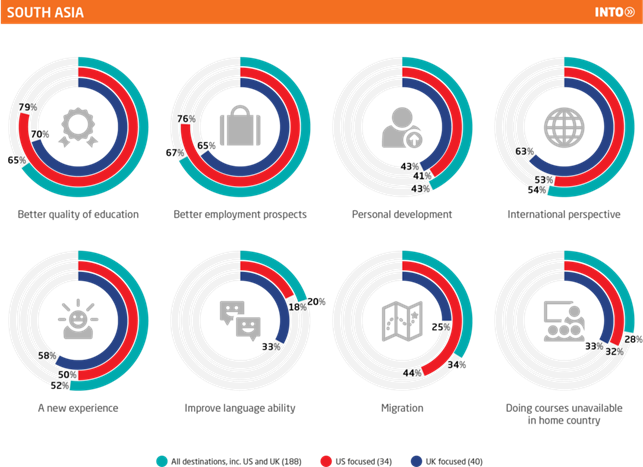
Students across all regions, especially those in China, are motivated by opportunities for personal development and the excitement of a new experience. An excellent piece in Inside Higher Ed warns institutions not to view students as threats or cash cows. This survey provides further evidence that behind the responses are individuals and families who are looking for transformative education experiences—one that will boost their long-term career prospects and provide them with opportunities to experience new cultures. They do not have to come to the United States, the United Kingdom, or other emerging study destinations, but they choose to because they perceive the quality of education and opportunities available in these locations to be better. If this survey teaches us anything, it is that we need to support those aspirations and dreams rigorously. While the survey results have not changed much from year to year, we are now working with Generation Z students. Those born after 1996 now represent 32 percent of the global population. In India alone, the population of Gen Z-ers is estimated to be 422 million, 51% greater than that of China at 312 million. This new generation is globally connected, and it has great expectations—of timely service and the educational opportunities that await them.